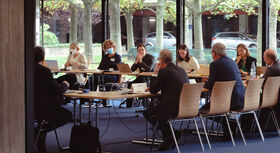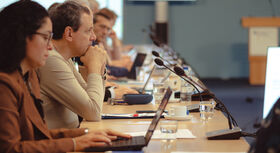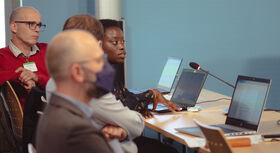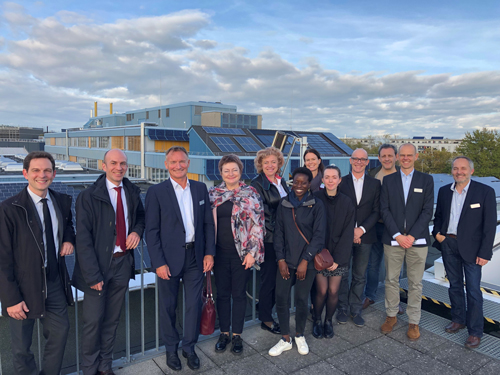European “Peer Learning Activity”: VET and the green transition
Vocational education and training is a key factor in the ecological transformation – such is the firm conviction in the European Working Group on vocational education and training and the green transition. At their Peer Learning Activity in Bonn, the focus was on the path to the green economy and urgent questions about building up skills.

On October 24th and 25th, the Federal Ministry of Education and Research (BMBF) and the European Commission invited the European Working Group on vocational education and training and the green transition to Bonn. In the spirit of peer learning, around 40 participants benefited from insights into research, policy and practice in Germany and exchanged views on the different approaches in their respective countries.
There is no question that the topic of sustainability, together with digitalisation, is of immense importance for the VET context throughout Europe and requires consistent action. Exchanges focused on the following topics:
- Adaptation of the curricula in vocational education and training on the way to the green economy: ecological sustainability as a job-specific and transversal topic
- Early identification of necessary skills and new jobs in the field of sustainability: skills intelligence for evidence-based, future-oriented vocational education and training
- Training and further education of training staff in companies and at vocational schools: multipliers in education for sustainable development
VET is effective in the "green" transformation

In his opening speech, Peter Thiele, Head of Unit 315 "Continuing Vocational Education and Training" at the BMBF, emphasised the effectiveness of vocational education and training on the way to a more sustainable economy and working environment in Germany.
Against the background of the coalition agreement, strategic initiatives such as the National Hydrogen Strategy and the updated National Skills Strategy support climate policy goals. Achieving these goals, however, is a joint effort by all relevant actors from politics, education, research, the labour market and business. The impact of the Covid-19 pandemic, unstable supply chains, the energy crisis and the Russian war in Ukraine exacerbate the challenging situation.
Thiele further stated that the growth in green professions, which goes hand in hand with the focus on decarbonisation, places high demands on VET. The need for qualified specialists, especially in occupational groups that are central to the green economy, such as construction and technical occupations, exceeds the supply on the German labour market. With reference to the federal government's skilled labour strategy, Peter Thiele underlined the goals of further increasing the attractiveness of vocational training and further education in Germany and of effectively raising potential in target groups that have not been reached so far, for example among women in part-time employment, low-skilled workers and migrants. In addition, Germany relies on skilled workers immigrating from Europe and abroad.
Tim van Rie, representative of the European Commission, reiterated in his welcome address that the “3D challenges” – decarbonisation, digitization and demographic change – affect the EU as a whole. With a focus on ecological sustainability, the working group offers space to exchange views on pressing issues in vocational education and training and to learn from each other despite all the differences in the systems of the European Education Area. In particular, green skills are a core topic, encouraged by the “European Year of Skills” proclaimed by the EU Commission for 2023.
Impulses from research and practice

On the first day of the event, the speakers gave insights into research projects on the influence of the ecological transformation on job profiles as well as vocational training and further training programmes in Germany.
- Timo Schnepf (BIBB) – Research project on ecological sustainability as an attractiveness dimension in vocational training: Evaluation of online job advertisements on aspects of the "Green Economy"
- Dr. Markus Janser (IAB) – Research project on the “Greening of Jobs”, i.e. the orientation of jobs in production, administration and in the service sector towards environmental compatibility, resource conservation and sustainability: Effects of the increase in environmental protection-related skills and job characteristics (Green Job Tasks) in occupations on the Employment opportunities and risks of the employees as well as on the individual remuneration
- Thomas Felkl (BIBB) – Research project on hydrogen as a topic in vocational training in the context of the energy transition (H2PRO): Identification of competence requirements and qualification needs and derivation of recommendations for action for vocational training policy and practice
- Freja Mørch (Ministry of Children and Education, Denmark) - Insight into Denmark's strategy for strengthening ecological transformation and promoting skills for sustainability in VET (VET in Denmark)
The second day was dedicated to projects dealing with the development of sustainability-related skills, especially for VET teachers and trainers.
- Sören Schütt-Sayed (Technical University of Hamburg) - Results of the scientific monitoring of the BIBB pilot project "Vocational Training for Sustainable Development" (BBNE): Presentation of a competence model for BBNE and didactic guidelines as well as teaching concepts for training staff to promote and impart sustainability-related competences
- Martin Wittau (German Federal Association for Sustainability) - BIBB pilot project and transfer project for the dissemination and consolidation of a further training offer for company training staff to develop sustainability-related and digital skills (INEBB 1 and 2)
- Petra Zimmermann-Bargstedt (DIHK-Bildungs-gGmbH) – Insight into the IHK management training SUSTAINABLE SUCCESSFUL LEADERSHIP: “Sustainable Mentor” certificate course to support sustainable cultural change in companies
Common challenges and fields of action

Moderated by Isabelle Le Mouillour, Head of Section “VET in International Comparison, Research and Monitoring” at BIBB, the participants discussed common challenges based on the presentations and identified fields of action:
- Standards and certifications for "green skills": defining transversal and job-specific sustainability skills
- Bottlenecks in qualified training staff in companies and vocational schools: reaching training staff as multipliers and drivers of transformation with attractive further training offers
- Accompanying sustainable cultural change in small and medium-sized companies: effectively promoting transformation processes and further training
The participants agreed that the cross-cutting issue of sustainability requires a holistic approach. It is central to:
- Create synergies between digital transformation and sustainability in all three dimensions: ecological, economic and social;
- Promote cooperation between practice and research, and to generate evidence - involving all stakeholders - for practice-oriented policies that specifically contribute to the integration of sustainability in vocational education and training.
After fruitful exchanges, two parallel site visits rounded off the program for the European guests.
Tram upcycling at SWB Bonn-Beuel © BIBB
In preparation for the site visit, two presentations took place. Anja Wenmakers, Managing Director of Stadtwerke Bonn, presented the SWB and their sustainable mobility concept as well as their international cooperation. Then Britta Robels, project manager at the VDV Academy, informed about the InnoVET project "UpTrain". Afterwards, the participants visited the SWB depot in Bonn-Beuel, where trams are upcycled. In the workshop, the delegation was given a very impressive explanation of the work steps involved in the refurbishment, what skills are required and how cross-professional work is carried out hand in hand, as well as what the added value of this sustainable concept is compared to buying a new tram.

Europeans on the roof of AusbildungsCampus in Cologne © BIBB
In a lively exchange with the participants, the head of the training campus of the Cologne Chamber of Crafts, Ralph Elbert, and his colleague Joachim Decker, head of technical management consulting, presented the work of the “AusbildungsCampus”. They introduced the European guests to the concept of "inter-company apprenticeship training" for compulsory practical training content. Three aspects of sustainability in practical training were outlined: the integration of sustainability topics in job-specific curricula and in the concrete content of the courses offered by the training campus, examples of sustainability-related course content, and sustainable practice on the training campus as implicit training of a sustainable mindset among trainees. The highlight was the tour of the systems that are also used for training, e.g. a heat pump, a field cell and the solar panels on the roofs of the training campus.
The "Peer Learning Activity" underlined – despite all the differences in the systems and approaches to VET – the contribution that excellent, high-quality vocational education and training can make in shaping the ecological transformation. Qualified trainers, teachers and lecturers play a key role. At the same time, the potential of digitalisation to support the transformation is not yet sufficiently recognised and tapped into. All the more reason to keep up fruitful exchanges between European partners.